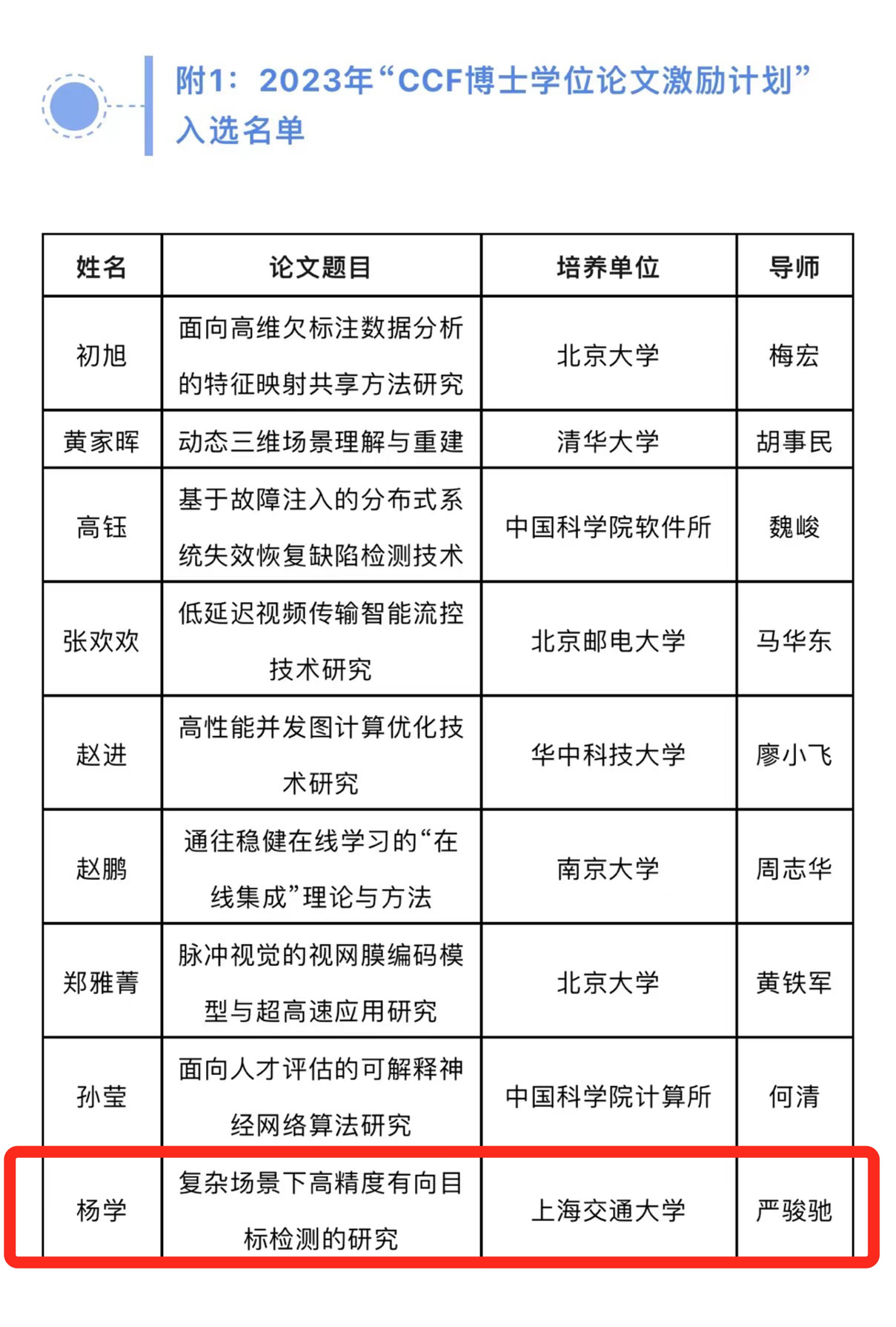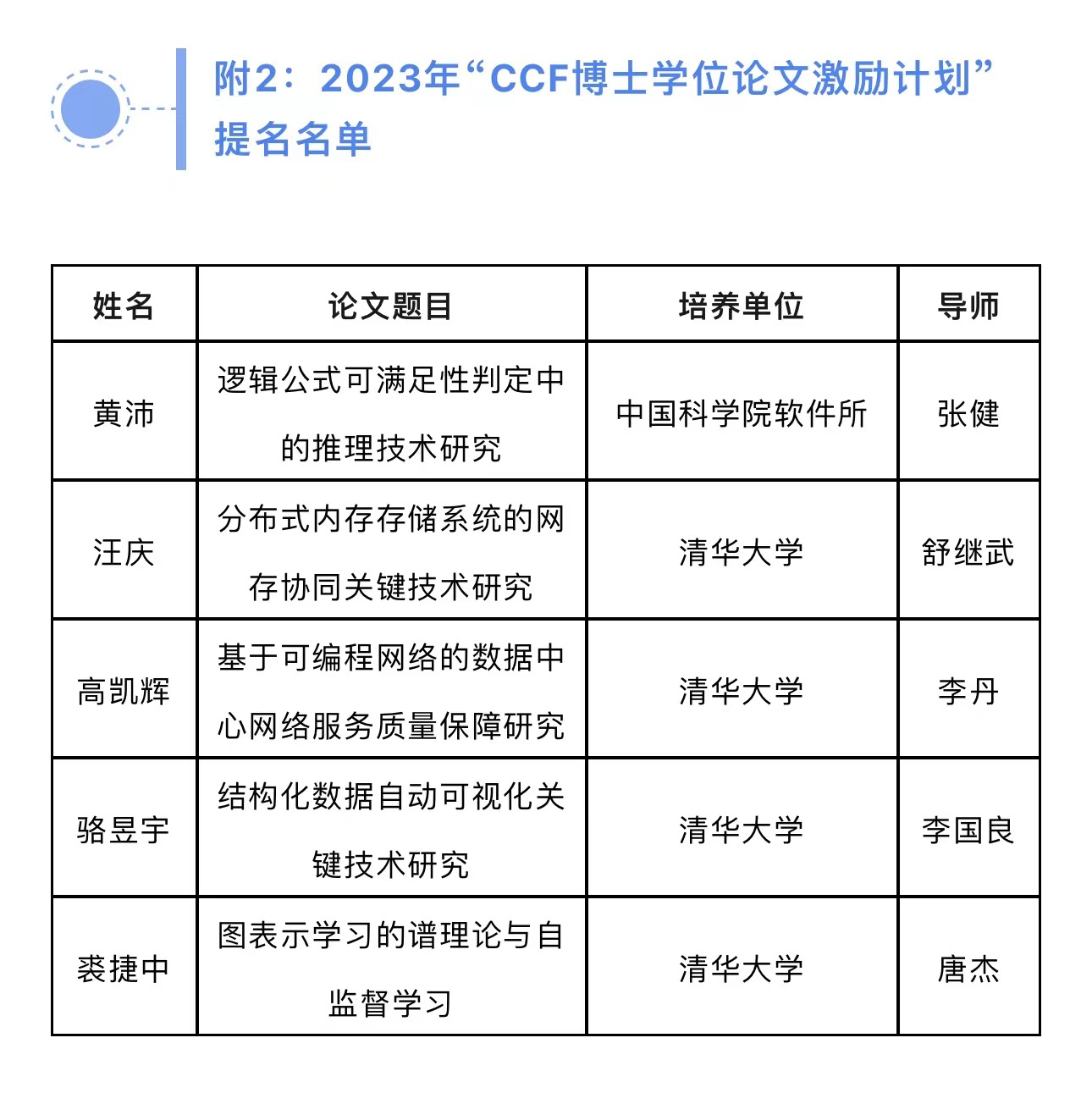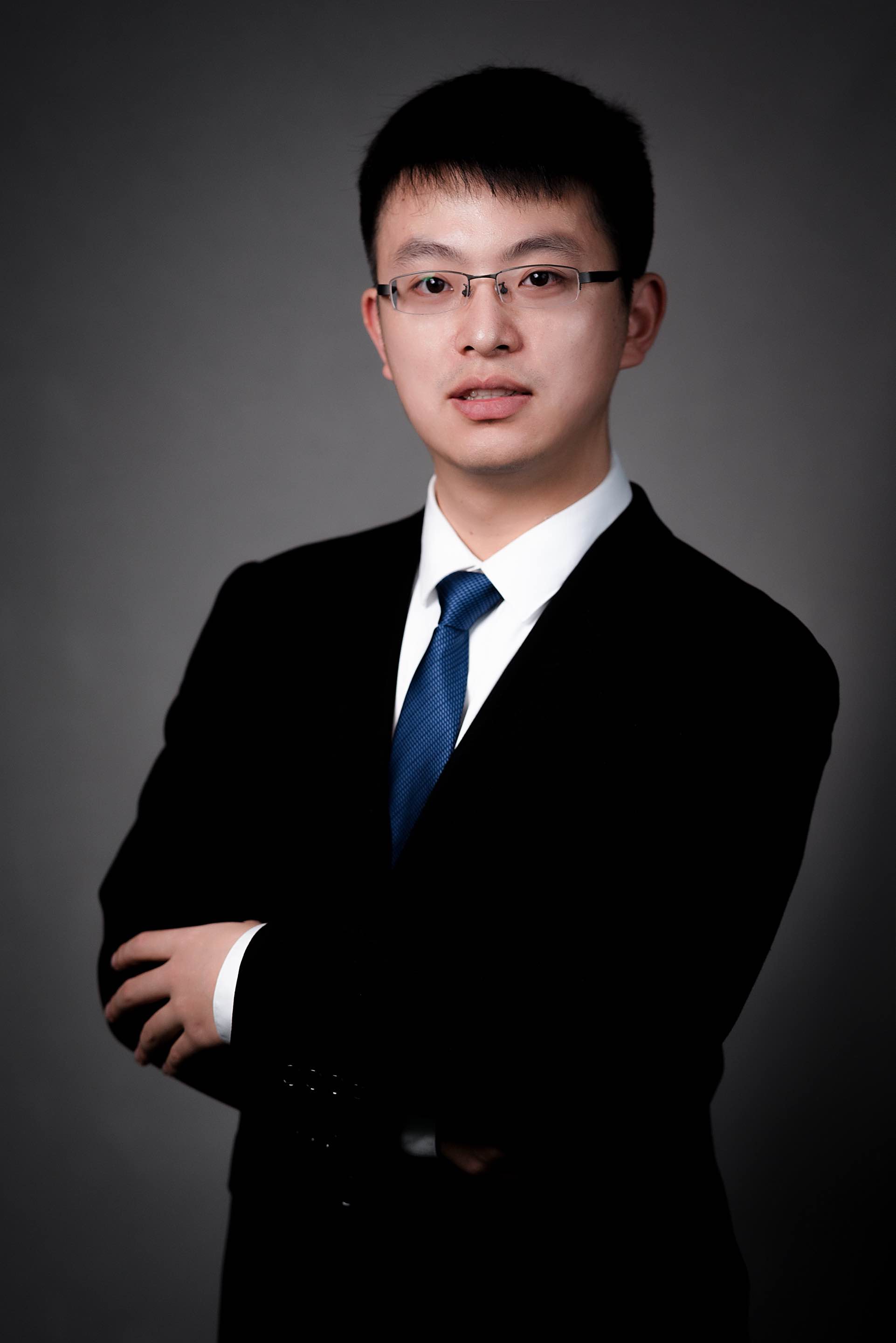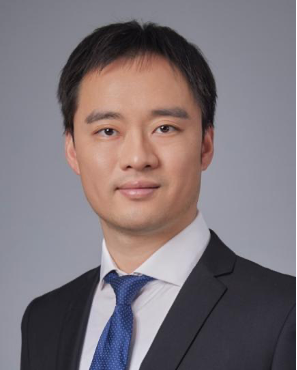On December 26th, the China Computer Federation (CCF) announced the results of the 2023 CCF Doctoral Dissertation Incentive Program. Yang Xue, a 2023 Ph.D. graduate from the Computer Science Department at Shanghai Jiao Tong University, got selected into this program with his doctoral dissertation titled 'High-Precision Oriented Object Detection in Complex Scenes'. His advisor is Prof. Yan Junchi from the Computer Science Department.
The CCF Doctoral Dissertation Incentive Program aims to promote technological advancements in the field of computer science, encourage innovative research, and recognize outstanding achievements by young scholars in solving theoretical and practical problems in the field.
A total of 9 papers were selected for the 2023 CCF Doctoral Dissertation Incentive Program, while 5 papers received nominations.


Dissertation Overview:
Oriented object detection is a significant research area with wide applications in scene text, remote sensing image interpretation, autonomous driving, and facial recognition. Yang Xue's dissertation, focusing on high-precision oriented object detection in complex scenes, conducts in-depth research across four main aspects: network structure design, target pose representation, labeled training data optimization, and open-source tool development. The primary contributions of the dissertation include:
1. Network Structure Design (Benchmark Algorithm): Introduces important structures of oriented object detectors and designs a detector with progressive regression from coarse to fine, addressing feature misalignment issues while achieving a balance between speed and accuracy. This work was selected as the most influential AAAI21 paper by Paper Digest.
2. Target Pose Representation (Parameter Optimization): Addresses crucial problems in oriented object detection, such as the "boundary discontinuity," " square-like detection," and "approximation of rotation IoU loss." These problems are solved through detailed angle classification, Gaussian distribution representation, and metric analysis. The proposed Gaussian modeling method unifies these issues, achieving high-precision oriented object detection, and has been implemented in practical scenarios, including projects with Anhui Kuwa Robotics in garbage/vehicle detection and Huawei Cloud in card verification.
3. Labeled Training Data Optimization (Training Data): Introduces the first weakly supervised oriented object detection framework based on horizontal bounding box annotations. This framework closely matches the performance, speed, and storage requirements of supervised algorithms, reducing annotation costs by 36.5%. It holds significant commercial potential and has been adopted by companies like Kuaishou for logo detection projects.
4. Open-Source Tool Development (Integrated Tools): Builds three distinctive oriented object detection tools based on TensorFlow, PyTorch, and Jittor, named MMRotate (1.6k stars), AlphaRotate (1k stars), and JDet (180 stars), respectively. These tools cater to academic research, industrial deployment, and domestication, becoming some of the most popular open-source frameworks in both industry and academia.
Personal Background:

Yang Xue, a 2023 Ph.D. graduate from the Computer Science Department at Shanghai Jiao Tong University, is a member of the Wu Wenjun AI Ph.D. program and currently serves as a young researcher at the Shanghai AI Laboratory. His research focuses on foundational visual studies. During his doctoral studies, Yang Xue authored a total of 20 CCF-A/T1 and Tsinghua-A level papers, including 14 as the first author. These publications include two each in TPAMI, NeurIPS, and ICLR, as well as single contributions to IJCV, CVPR, ICCV, ECCV, ICML, AAAI, ACM MM, and 'China Science: Information Science.' He has received numerous honors, including the CCF-CV Emerging Scholar Award (top three nationally), two National Scholarships, Shanghai Outstanding Graduate, Shanghai Jiao Tong University Academic Star Nomination Award (top 20 campus-wide), PaperDigest-AAAI21 Most Influential Paper ranking first, and inclusion in the 2022 and 2023 Global Top 2% Scientists list by Stanford University. His Google Scholar citations total approximately 4600, with an h-index of 23 and i10-index of 30, including 12 papers with over a hundred citations, one ESI Hot Paper, and five ESI Highly Cited Papers. His GitHub repositories have received over 8000 stars.
Supervisor Introduction:

Prof. Yan Junchi, a professor in the Computer Science Department at Shanghai Jiao Tong University, is a national-level high-level talent, CCF Outstanding/Elite Member, and IET Fellow. He is the leader of the Ministry of Science and Technology's 2030 New Generation Artificial Intelligence Major Project and the National Natural Science Foundation's Key Research Program. He is a chief expert in deep learning for the Ministry of Education's resource construction. Previously, he was the Chief Researcher at IBM China Research Institute. His main research direction is machine learning and its applications. Prof. Yan has published over 150 CCF-A level papers as the first/corresponding author, with over 15,000 citations. He serves as the area chair of top conferences such as ICML, NeurIPS, ICLR, CVPR, and AAAI, as well as a senior editor for journals like Pattern Recognition and ACM TOPML. He has been recognized with the PaperDigest-AAAI21 and IJCAI23 Most Influential Paper rankings. Prof. Yan has instructed students to win awards such as the Shanghai Jiao Tong University Academic Star, CCF Sinan Cup First Prize, CCF-CV Emerging Scholar Award, Challenge Cup Special Prize, and IWLS2023 EDA Logic Synthesis Championship, as well as honors and funding from the National Natural Science Foundation for Undergraduates.